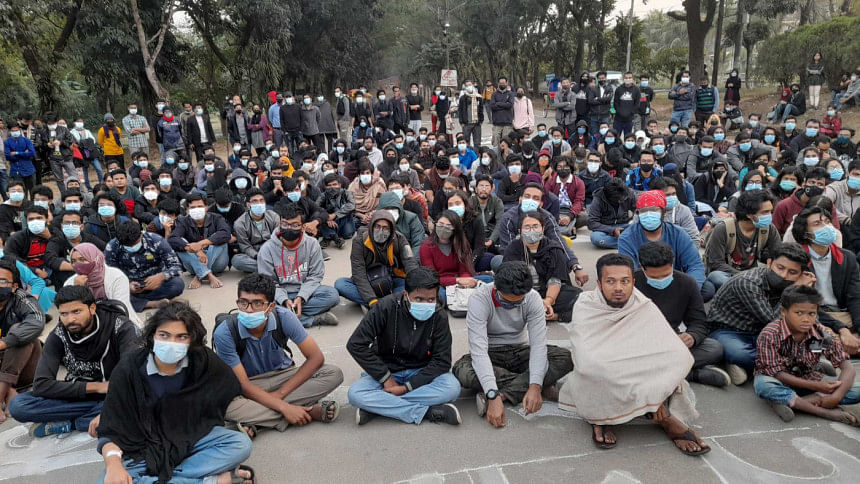Impropriety, Irregularity and Impunity

After seven long days, the 28 protesting students of Shahjalal University of Science and Technology (SUST) ended their hunger strike, bringing relief to their loved ones and fellow protesters. Unfortunately, there is little indication that the crisis that pervaded the campus for almost a fortnight is about to be over. On the one hand, students stand firm on their demand for the resignation of the vice-chancellor (VC); on the other, the administration remains oblivious to the impasse. While the lack of initiative by the beleaguered VC is understandable, the insensitivity and inaction by the government—more specifically by the education ministry—to engage in a meaningful dialogue to address the students' grievances is unconscionable. Citizens were appalled by the failure of senior functionaries of the state to engage with the students in addressing their concerns, and appealing to them to bring an end to the hunger strike.
The SUST situation has triggered a mixed reaction in various quarters. The SUST VC's inability to handle the discontent of the residents of a female dormitory and take timely action against the errant provost, his reticence to acknowledge, let alone act upon, the genuine grievances of general students of the university, and his alleged granting of permission to law enforcement agencies into the campus, who resorted to brute force to disperse the protesting students, have resulted in solidarity protest marches, rallies and human chains at public universities across Bangladesh—including those in Dhaka, Khulna, Rajshahi and Barishal. The University Teachers' Network, Bangladesh, a coalition of progressive teachers of various universities, and the Conscientious Citizens' Forum, which organised a long march from Dhaka to Sylhet, endorsed the demand for the SUST VC's resignation. In the print, electronic and social media, commentators, columnists and netizens expressed their disappointment on how the matter was handled, and outrage at the excessive use of force. Even some lawmakers expressed solidarity with the protesters.
However, contrary to such rational responses, it is revealing that two important stakeholders of higher education, the university teachers' associations and the vice-chancellors' forum, have not only espoused a very contrasting view, but have belligerently put that view across for public consumption.
In a statement on January 20, the Bangladesh Federation of University Teachers' Association (BFUTA), the apex body of all university teachers' associations in the country, expressed grave concern over "a quarter with vested interest trying to divert the ongoing student protest at SUST and hatching conspiracy." The association called upon the government to investigate if there is any conspiracy involving the SUST protest and take necessary steps to this end. "We are concerned that a quarter is trying to disrupt the existing peaceful situation in all the university campuses in the country by involving the students as part of its conspiracy to destabilise the country," the statement read. Thus, the BFUTA was convinced that there is a plot to mobilise "the protesting innocent students to turn their protest into an anti-government movement" (The Daily Star, January 21, 2022).
Days later, in the same spirit in an appeal to the authorities to resolve the dispute, the Dhaka University Teachers' Association demanded "an investigation into whether there was any incitement behind the police action during the protests at SUST." Their statement noted, "It appears that a third party is trying to manipulate the situation into becoming an anti-government movement" (The Business Standard, January 24, 2022). Earlier, the education minister also hinted at possible intervention from outsiders to divert the movement to another way (The Business Standard, January 22, 2022).
The lack of empathy for the students in the BFUTA and DUTA statements is startling. There was no mention of the students' justifiable demands pertaining to the quality of food served in the dormitories, poor access to the internet, inefficient administration and the like that triggered the initial discontent. The absence of the spirit of dialogue and accommodation on the university administration's part towards the protesting students that escalated the tension was also ignored by the associations. Their silence on the brutal attacks on the protesting students by the student wing of the ruling party was deafening. While the DUTA statement referred to the "attack of the police force," the BFTUA remained completely hushed on this critical factor that strengthened the students' resolve in demanding their VC's resignation. Needless to say, the associations failed to provide a shred of evidence in support of the allegations they made.
The partisan stance of the teachers' associations, though painful, is hardly surprising. Gone are the days when a teacher was "friend, guide and philosopher" of the students whom they mentored. One wonders if those in the leadership of teachers' associations championing "the spirit of the Liberation War" are at all aware of Dr Mohammad Shamsuzzoha, who was shot dead for protecting the students of Rajshahi University against a Pakistan Army unit during the 1969 students' movement. Just before being shot by an army captain at point blank range, Dr Zoha is famously known to have declared, "Before any bullet strikes any student, it will hit me." His death acted as a catalyst of the mass uprising that subsequently toppled General Ayub Khan.
In an unusual development, VCs of 34 public universities in the country expressed solidarity with the controversial SUST VC. In a statement issued after a virtual meeting of the Association of Universities of Bangladesh (AUB), the VCs noted that the chaos created in demanding the removal of the SUST VC "is a conspiracy." "The ongoing protest seems to be a part of a conspiracy to destroy the education system by creating an anarchic situation in SUST as well as in other educational institutes," read the statement. They also termed the demand for resignation as "unethical." Expressing solidarity with SUST VC at a virtual meeting, the association members said they were ready to resign en masse if SUST VC was to resign (Prothom Alo, January 23, 2022).
Instead of having a calming effect on an already charged environment—a role that was expected from this eminent body—such a confrontational stance of AUB reflected its partisan stance on behalf of the administration, and belittled the agency of the students who, defying all odds, were essentially protesting against the wrongs they have been subjected to.
The VCs' threat of en masse resignation was particularly revealing. It betrayed their collective anxiety about the unfurling of a domino effect. In other words, the VCs were worried that involuntary resignation of the SUST VC may encourage students of their own institutions to resort to similar protests against them. Perhaps the VCs are well aware of the simmering discontent among students in the public universities. Included among those are unfair allocation of seats and poor quality of food served in dormitories, poor internet services, unaccountability of teachers, delayed publication of results to general administrative inefficiency, the absence of the right to organise, speak and elect their representatives freely, and the high-handedness that the ruling party supporters exercise with impunity.
These failings of the heads of public universities (who are generally appointed on political considerations, rather than their intellectual and administrative abilities) have had a dampening effect on the intellectual firmament of campuses, and contribute to further politicisation of the institutions concerned, undermining their autonomous status.
There is little surprise that such a dispensation works as a breeding ground for corruption. After due investigation, the University Grants Commission (UGC) recommended actions against several VCs for alleged corruption and irregularities over the last few years. Included among the charges listed by the UGC were corruption and nepotism in recruitment of faculty and staff members, discrimination in promoting staff members, non-transparent monetary practices including withdrawal of excess honorarium, irregularities in infrastructure construction, procurement and purchase, unauthorised occupation and use of university property, and unauthorised holding of several administrative posts. It is against this bleak backdrop that the priority of the administration and those of law enforcement agencies becomes starkly pronounced, when five former SUST students (among them two architects and two engineers) were arrested allegedly for funding the ongoing student protests.
The UGC's recommendation failed to generate any action against the delinquent VCs. Irked by the ministry's inaction, the UGC chair feels that "such inaction against the VCs after probes found them guilty are disappointing" and "it gives wrong message and a kind of impunity" to them and others. Elaborating the point, a UGC member notes, "Some have become more reckless in the absence of punishment" (The Daily Star, May 18, 2021).
Decades ago, Dr Abdur Rashid, VC of Bangladesh University of Engineering and Technology (Buet), reportedly advised the Governor's Office to check scripts of all admission seekers when he was approached to admit one candidate who could not pass the admission test. The Governor's Office backed off. Readers may note that the incident happened during Pakistan's rule, and the universities enjoyed no autonomy then.
CR Abrar, a former faculty member of Dhaka University, is a member of Nagorik, a platform for human rights and the rule of law.

 For all latest news, follow The Daily Star's Google News channel.
For all latest news, follow The Daily Star's Google News channel. 



Comments